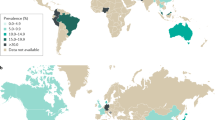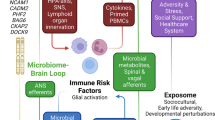Abstract
Introduction
Gastrointestinal symptoms such as heartburn, indigestion (or dyspepsia), bloating, distension, constipation, abdominal pain, abdominal discomfort and diarrhoea are extremely common worldwide. For some, such symptoms can prove to be chronic and disabling.
Methods
The recent literature on irritable bowel syndrome and, in particular, work emanating form this authors research group, was reviewed.
Results
These functional symptoms commonly occur in aggregations, referred to as functional gastrointestinal disorders (FGIDs). Some of the FGIDs and, most notably irritable bowel syndrome (IBS), have achieved a degree of scientific and clinical credibility as coherent entities. Several lines of evidence ranging from gut motility to the microbiota are under investigation in attempts to explain IBS or its symptomatology.
Conclusion
Though biomarkers for IBS and other FGIDs have proven elusive, considerable progress has been made in understanding possible aetiological factors in IBS; progress which may well lead to better therapeutic strategies.
Similar content being viewed by others
References
Quigley E, Hunt R (2012) World digestive health day 2012. J Clin Gastroenterol 46:i–ii
Quigley EMM, Abdel-Hamid H, Barbara G et al (2012) A Global Perspective on Irritable Bowel Syndrome. A Consensus Statement of the World Gastroenterology Organization (WGO) Summit Task Force on Irritable Bowel Syndrome. J Clin Gastroenterol 46:356–366
Quigley EMM (2007) The “Con” case. The Rome process and functional gastrointestinal disorders: the barbarians are at the gate! Neurogastroenterol Motil 19:793–797
Quigley EMM, Shanahan F (2009) The language of medicine: words as servants and scoundrels. Clin Med 9:131–135
Walsh K, McWilliams SR, Maher MM et al (2012) The spectrum of functional gastrointestinal disorders in a tertiary referral clinic in Ireland. Ir J Med Sci 181:81–86
Desmond AN, McWilliams S, Maher MM et al (2012) Radiation exposure from diagnostic imaging among patients with gastrointestinal disorders. Clin Gastroenterol Hepatol 10:259–265
O’Connor OJ, McSweeney SE, McWilliams S et al (2012) Role of radiologic imaging in irritable bowel syndrome: evidence based review. Radiology 262:485–494
Khashan AS, Quigley EMM, McNamee R et al (2012) Increased risk of miscarriage and ectopic pregnancy in patients with irritable bowel syndrome. Clin Gastroenterol Hepatol 10:902–909
Quigley EMM (2004) Functional gastrointestinal disorders; has the genomic era arrived? Gastroenterology 126:1193–1195
Craig OF, Quigley EMM (2010) Bacteria, genetics and irritable bowel syndrome. Expert Rev Gastroenterol Hepatol 4:271–276
Quigley EMM (2005) Disturbances of motility and visceral hypersensitivity in irritable bowel syndrome: biological markers or epiphenomenon. Gastroenterol Clin N Am 34:221–233
McKee DP, Quigley EMM (1993) Intestinal motility and the irritable bowel syndrome—is IBS a motility disorder? Part 1. Definition of IBS and colonic motility. Dig Dis Sci 38:1761–1772
McKee DP, Quigley EMM (1993) Intestinal motility and the irritable bowel syndrome—is IBS a motility disorder? Part 2. Motility of the small bowel, esophagus, stomach and gall bladder. Dig Dis Sci 38:1773–1782
Quigley EMM (2003) From comic relief to real understanding; how intestinal gas causes symptoms. Gut 52:1659–1661
McWilliams SR, O’Connor OJ, McGarrigle A-M et al (2012) CT-based estimation of intra-cavitary gas volumes using threshold-based segmentation: in vitro study to determine the optimal threshold range. J Med Imag Radiat Oncol 56:289–294
McWilliams SR, Mc Laughlin PD et al (2012) Computed tomography assessment of intestinal gas volumes in functional gastrointestinal disorders. J Neurogastroenterol Motil 18:419–425
Azpiroz F, Malagelada JR (2005) The pathogenesis of bloating and visible distension in irritable bowel syndrome. Gastroenterol Clin North Am 34:257–269
Galati JS, McKee DP, Quigley EMM (1995) The response to intraluminal gas in the irritable bowel syndrome: motility versus perception. Dig Dis Sci 40:1381–1387
Tillisch K, Labus JS (2011) Advances in imaging the brain-gut axis: functional gastrointestinal disorders. Gastroenterology 140:407–411
Dinan TG, Quigley EMM, Ahmed SMM et al (2006) Hypothalamic-pituitary- gut axis dysregulation in irritable bowel syndrome: plasma cytokines as a potential biomarker? Gastroenterology 130:304–311
Mayer EA (2011) Gut feelings: the emerging biology of gut-brain communication. Nat Rev Neurosci 12:453–466
North CS, Hong BA, Alpers DH (2007) Relationship of functional gastrointestinal disorders and psychiatric disorders: implications for treatment. World J Gastroenterol 13:2020–2027
Ghoshal UC, Shukla R, Ghoshal U et al (2012) The gut microbiota and irritable bowel syndrome: friend or foe? Int J Inflamm 2012:151085
Spiller R, Lam C (2012) An update on post-infectious irritable bowel syndrome: role of genetics, immune activation, serotonin and altered microbiome. J Neurogastroenterol Motil 18:258–268
Quigley EMM (2007) A 51-year-old with IBS. Test or treat for bacterial overgrowth? Clin Gastroenterol Hepatol 5:114–1143
Pimentel M, Lembo A, Chey WD et al (2011) Rifaximin therapy for patients with irritable bowel syndrome without constipation. N Engl J Med 364:22–32
O’Mahony L, McCarthy J, Kelly P et al (2005) Lactobacillus and bifidobacterium in irritable bowel syndrome: symptom responses and relationship to cytokine profiles. Gastroenterology 128:541–551
Konieczna P, Groeger D, Ziegler M et al (2012) Bifidobacterium infantis 35624 administration induces foxp3 + 1 T regulatory cells in human peripheral blood—potential role for myeloid and plasmacytoid dendritic cells. Gut 61:354–366
Konieczna P, Akdis CA, Quigley EMM et al (2012) Portrait of an immunoregulatory bifidobacterium. Gut Microbes 3:1–6
Jeffery IB, Quigley EM, Ohman L, et al. (2012) The microbiota link to irritable bowel syndrome: an emerging story. Gut Microbes. 3 [Epub ahead of print]
Fraher MH, O’Toole PW, Quigley EMM (2012) Techniques used to characterise the intestinal microbiota: a guide for the clinician. Nat Rev Gastroenterol 9:312–322
Codling C, O’Mahony L, Shanahan F et al (2010) A molecular analysis of fecal and mucosal bacterial communities in irritable bowel syndrome. Dig Dis Sci 55:392–397
Jeffery IB, O’Toole PW, Ohman L et al (2012) An irritable bowel syndrome subtype defined by species-specific alterations in faecal microbiota. Gut 61:997–1006
Bravo JA, Forsythe P, Chew MV et al (2011) Ingestion of Lactobacillus strain regulates emotional behavior and central GABA receptor expression in a mouse via the vagus nerve. Proc Natl Acad Sci USA 108:16050–16055
Chadwick VS, Chen W, Shu D et al (2002) Activation of the mucosal immune system in irritable bowel syndrome. Gastroenterology 122:1778–1783
Clarke G, Quigley EMM, Cryan JF et al (2009) Irritable bowel syndrome: towards biomarker identification. Trends Mol Med 15:478–489
Scully P, McKernan DP, Keohane J et al (2010) Plasma cytokine profiles in females with irritable bowel syndrome and extra-intestinal co-morbidity. Am J Gastroenterol 105:2235–2243
Brint EK, MacSharry J, Fanning A et al (2011) Differential expression of toll-like receptors in patients with irritable bowel syndrome. Am J Gastroenterol 106:329–336
McKernan DP, Gaszner G, Quigley EM et al (2011) Altered peripheral toll-like receptor responses in irritable bowel syndrome. Aliment Pharmacol Ther 33:1045–1052
Chang L, Adeyemo M, Karagiannides I et al (2012) Serum and colonic mucosal immune markers in irritable bowel syndrome. Am J Gastroenterol 107:262–272
Keohane J, O’Mahony C, O’Mahony L et al (2012) IBS and IBD. Irritable bowel syndrome (IBS)-type symptoms in patients with inflammatory bowel disease (IBD): A real association or reflection of occult inflammation? Am J Gastroenterol 105:1789–1794
Quigley EMM, Shanahan F (2010) Irritable bowel syndrome and inflammatory bowel disease: is there an overlap? Pract Gastroenterol 34:32–37
Quigley EM, Bernstein CN (2012) Editorial: “irritable bowel symptoms” in inflammatory bowel disease: diagnostic uncertainty meets pathological reality. Am J Gastroenterol 107:1483–1485
O’Leary C, Wieneke P, Buckley S et al (2002) Coeliac disease and irritable bowel-type symptoms. Am J Gastroenterol 97:1463–1467
O’Leary C, Quigley EMM (2003) Small bowel bacterial overgrowth, coeliac disease, and IBS: what are the associations? Am J Gastroenterol 98:720–722
Hayes P, Corish C, O’Mahony E, et al. A dietary survey of patients with irritable bowel syndrome. (submitted)
Quigley EMM, Morcos A, Dinan T (2009) Irritable bowel syndrome—role of food in pathogenesis and management. J Dig Dis 10:237–246
Acknowledgments
Based on the 52nd Robert Graves lecture. The author wishes to acknowledge the contributions of the many co-investigators, collaborators, post-graduate and undergraduate students, as well as nursing, technical and administrative staff who have contributed to the research described in this paper. These studies have been supported, in part, by a grant from Science Foundation Ireland to the Alimentary Pharmabiotic Centre.
Author information
Authors and Affiliations
Corresponding author
Rights and permissions
About this article
Cite this article
Quigley, E.M.M. Bugs on the brain; brain in the gut—seeking explanations for common gastrointestinal symptoms. Ir J Med Sci 182, 1–6 (2013). https://doi.org/10.1007/s11845-012-0865-y
Received:
Accepted:
Published:
Issue Date:
DOI: https://doi.org/10.1007/s11845-012-0865-y




